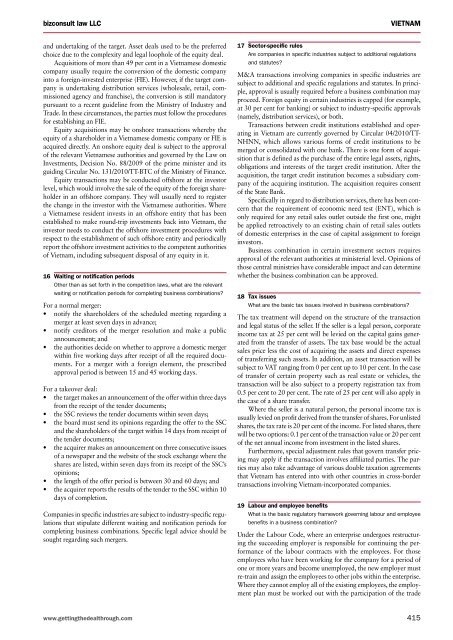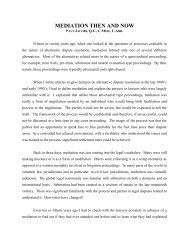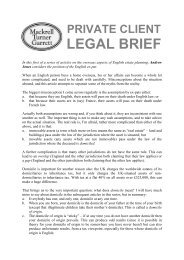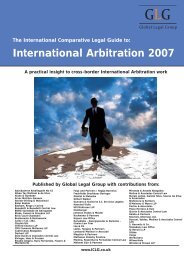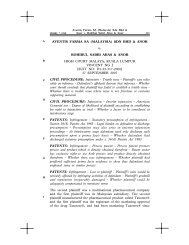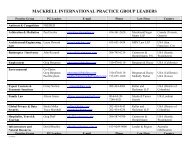Mergers & Acquisitions - Mackrell International
Mergers & Acquisitions - Mackrell International
Mergers & Acquisitions - Mackrell International
You also want an ePaper? Increase the reach of your titles
YUMPU automatically turns print PDFs into web optimized ePapers that Google loves.
izconsult law LLCVietnamand undertaking of the target. Asset deals used to be the preferredchoice due to the complexity and legal loophole of the equity deal.<strong>Acquisitions</strong> of more than 49 per cent in a Vietnamese domesticcompany usually require the conversion of the domestic companyinto a foreign-invested enterprise (FIE). However, if the target companyis undertaking distribution services (wholesale, retail, commissionedagency and franchise), the conversion is still mandatorypursuant to a recent guideline from the Ministry of Industry andTrade. In these circumstances, the parties must follow the proceduresfor establishing an FIE.Equity acquisitions may be onshore transactions whereby theequity of a shareholder in a Vietnamese domestic company or FIE isacquired directly. An onshore equity deal is subject to the approvalof the relevant Vietnamese authorities and governed by the Law onInvestments, Decision No. 88/2009 of the prime minister and itsguiding Circular No. 131/2010/TT-BTC of the Ministry of Finance.Equity transactions may be conducted offshore at the investorlevel, which would involve the sale of the equity of the foreign shareholderin an offshore company. They will usually need to registerthe change in the investor with the Vietnamese authorities. Wherea Vietnamese resident invests in an offshore entity that has beenestablished to make round-trip investments back into Vietnam, theinvestor needs to conduct the offshore investment procedures withrespect to the establishment of such offshore entity and periodicallyreport the offshore investment activities to the competent authoritiesof Vietnam, including subsequent disposal of any equity in it.16 Waiting or notification periodsOther than as set forth in the competition laws, what are the relevantwaiting or notification periods for completing business combinations?For a normal merger:• notify the shareholders of the scheduled meeting regarding amerger at least seven days in advance;• notify creditors of the merger resolution and make a publicannouncement; and• the authorities decide on whether to approve a domestic mergerwithin five working days after receipt of all the required documents.For a merger with a foreign element, the prescribedapproval period is between 15 and 45 working days.For a takeover deal:• the target makes an announcement of the offer within three daysfrom the receipt of the tender documents;• the SSC reviews the tender documents within seven days;• the board must send its opinions regarding the offer to the SSCand the shareholders of the target within 14 days from receipt ofthe tender documents;• the acquirer makes an announcement on three consecutive issuesof a newspaper and the website of the stock exchange where theshares are listed, within seven days from its receipt of the SSC’sopinions;• the length of the offer period is between 30 and 60 days; and• the acquirer reports the results of the tender to the SSC within 10days of completion.Companies in specific industries are subject to industry-specific regulationsthat stipulate different waiting and notification periods forcompleting business combinations. Specific legal advice should besought regarding such mergers.17 Sector-specific rulesAre companies in specific industries subject to additional regulationsand statutes?M&A transactions involving companies in specific industries aresubject to additional and specific regulations and statutes. In principle,approval is usually required before a business combination mayproceed. Foreign equity in certain industries is capped (for example,at 30 per cent for banking) or subject to industry-specific approvals(namely, distribution services), or both.Transactions between credit institutions established and operatingin Vietnam are currently governed by Circular 04/2010/TT-NHNN, which allows various forms of credit institutions to bemerged or consolidated with one bank. There is one form of acquisitionthat is defined as the purchase of the entire legal assets, rights,obligations and interests of the target credit institution. After theacquisition, the target credit institution becomes a subsidiary companyof the acquiring institution. The acquisition requires consentof the State Bank.Specifically in regard to distribution services, there has been concernthat the requirement of economic need test (ENT), which isonly required for any retail sales outlet outside the first one, mightbe applied retroactively to an existing chain of retail sales outletsof domestic enterprises in the case of capital assignment to foreigninvestors.Business combination in certain investment sectors requiresapproval of the relevant authorities at ministerial level. Opinions ofthose central ministries have considerable impact and can determinewhether the business combination can be approved.18 Tax issuesWhat are the basic tax issues involved in business combinations?The tax treatment will depend on the structure of the transactionand legal status of the seller. If the seller is a legal person, corporateincome tax at 25 per cent will be levied on the capital gains generatedfrom the transfer of assets. The tax base would be the actualsales price less the cost of acquiring the assets and direct expensesof transferring such assets. In addition, an asset transaction will besubject to VAT ranging from 0 per cent up to 10 per cent. In the caseof transfer of certain property such as real estate or vehicles, thetransaction will be also subject to a property registration tax from0.5 per cent to 20 per cent. The rate of 25 per cent will also apply inthe case of a share transfer.Where the seller is a natural person, the personal income tax isusually levied on profit derived from the transfer of shares. For unlistedshares, the tax rate is 20 per cent of the income. For listed shares, therewill be two options: 0.1 per cent of the transaction value or 20 per centof the net annual income from investment in the listed shares.Furthermore, special adjustment rules that govern transfer pricingmay apply if the transaction involves affiliated parties. The partiesmay also take advantage of various double taxation agreementsthat Vietnam has entered into with other countries in cross-bordertransactions involving Vietnam-incorporated companies.19 Labour and employee benefitsWhat is the basic regulatory framework governing labour and employeebenefits in a business combination?Under the Labour Code, where an enterprise undergoes restructuringthe succeeding employer is responsible for continuing the performanceof the labour contracts with the employees. For thoseemployees who have been working for the company for a period ofone or more years and become unemployed, the new employer mustre-train and assign the employees to other jobs within the enterprise.Where they cannot employ all of the existing employees, the employmentplan must be worked out with the participation of the tradewww.gettingthedealthrough.com 415


